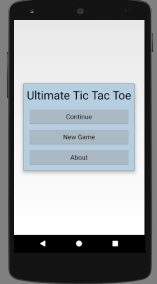Android井字游戏(一)首页制作
创建一个新程序:
应用名: Tic Tac Toe 公司域名: example.org 尺寸: Phone and Tablet 最低SDK: API16: Android 4.1 添加活动: Empty Activity 活动名: MainActivity 布局名: activity_main 标题: UT3
1 使用XML进行设计
1.1创建主屏幕——编辑activity_main.xml
<?xml version="1.0" encoding="utf-8"?> <FrameLayout xmlns:android="http://schemas.android.com/apk/res/android" xmlns:tools="http://schemas.android.com/tools" android:layout_width="match_parent" android:layout_height="match_parent" android:clipChildren="false" tools:context=".TicTacToeActivity"> <fragment android:id="@+id/main_fragment" class="org.example.tictactoe.MainFragment" android:layout_width="wrap_content" android:layout_height="wrap_content" android:layout_gravity="center" tools:layout="@layout/fragment_main" /> </FrameLayout>
以上标签的属性解释
xmlns:android="http://schemas.android.com/apk/res/android":定义命名空间android,以便能够在后面使用包含android:的属性名
xmlns:tools="http://schemas.android.com/tools":定义命名空间tools
android:layout_width="match_parent":将视图设置为与父视图等宽。由于是顶级元素,就是与屏幕等宽。
android:layout_height="match_parent":同上,与父视图等高。每个视图都要设置宽度和高度。
android:clipChildren="false"
tools:context=".TicTacToeActivity": 指出该布局文件是供TicTacToeActivity类使用的。不同于其他属性,该属性是供可视化编辑器使用的,而不是在运行
阶段使用的。
android:id="@+id/fragment_main":定义新资源标识符fragment_main,在代码或其他XML属性中使用。@+表示定义新内容,@表示引用已在其他地方定义过的内容。
class="org.example.tictactoe.MainFragment":让android知道该片段是MainFragment类的一个实例。换句话说,android在根据XML创建该片段时,将创建
一个MainFragment实例。
android:layout_width="wrap_content":将片段设置为与其包含的内容等宽。
android:layout_height="wrap_content":将片段设置为与其包含的内容等高。
android:layout_gravity="center":将片段在其父视图中居中设置。还可设置为(top、bottom、left、right、center、fill、top|right等)
tools:layout="@layout/fragment_main":引用另一个XML文件
1.2 创建主片段——编辑fragment_main.xml
要将4个元素排成一列,因此使用 LinearLayout布局
<?xml version="1.0" encoding="utf-8"?> <LinearLayout xmlns:android="http://schemas.android.com/apk/res/android" xmlns:tools="http://schemas.android.com/tools" android:layout_width="match_parent" android:layout_height="match_parent" android:background="@drawable/menu_background" android:elevation="@dimen/elevation_high"
android:orientation="vertical"
android:padding="@dimen/menu_padding"
tools:context=".TicTacToeActivity">
<TextView android:layout_width="wrap_content" android:layout_height="wrap_content" android:layout_marginBottom="@dimen/menu_space" android:text="@string/long_app_name" android:textAppearance="?android:textAppearanceLarge" android:textSize="@dimen/menu_text_size" /> <Button android:id="@+id/continue_button" android:layout_width="match_parent" android:layout_height="wrap_content" android:layout_margin="@dimen/menu_button_margin" android:padding="@dimen/menu_button_padding" android:text="@string/continue_label"/> <Button android:id="@+id/new_button" android:layout_width="match_parent" android:layout_height="wrap_content" android:layout_gravity="center" android:layout_margin="@dimen/menu_button_margin" android:padding="@dimen/menu_button_padding" android:text="@string/new_game_label"/> <Button android:id="@+id/about_button" android:layout_width="match_parent" android:layout_height="wrap_content" android:layout_gravity="center" android:layout_margin="@dimen/menu_button_margin" android:padding="@dimen/menu_button_padding" android:text="@string/about_label"/> </LinearLayout>
以上标签的属性解释
android:background="@drawable/menu_background":设置整个视图的背景。
android:elevation="@dimen/elevstion_high":令视图比画布稍高。
android:orientation="vertical":指定布局的方向。可能取值vertical(排成一列), horizontal(排成一行)
android:padding="@dimen/menu_padding":让android在视图内部留出少量的空间。若在外部留空间用margin。
android:layout_marginBottom="@dimen/menu_space":在文本视图和按钮之间留出一定空间。
android:text="@string/long_app_name": 指定要显示的文本
android:textAppearance="?android:textAppearanceLarge":让文本字体比常规状态更大更粗。?表示引用了当前主题中定义的一个常量。
android:textSize="@dimen/menu_text_size" :用硬编码的方式指定了更大的字号。
android:layout_margin="@dimen/menu_button_margin":在按钮周围留出一些额外的空间。
android:padding="@dimen/menu_button_padding":在按钮内部留出一些额外的空间。
android:text="@string/continue_label":指定按钮要显示的文本。
2 编写代码
2.1 定义主活动——MainActivity.java
package org.example.tictactoe; import android.app.Activity; import android.os.Bundle; public class MainActivity extends Activity { @Override protected void onCreate(Bundle savedInstanceState) { super.onCreate(savedInstanceState); setContentView(R.layout.activity_main); } }
2.2 主活动使用的片段——MainFragment.java
先添加about框
package org.example.tictactoe; import android.os.Bundle; import android.app.AlertDialog; import android.app.Fragment; import android.content.DialogInterface; import android.content.Intent; import android.view.LayoutInflater; import android.view.View; import android.view.ViewGroup; public class MainFragment extends Fragment { private AlertDialog mDialog; @Override /**inflater 可用于将XML转换为视图 * container 指向父容器的引用 * savedInstanceState 保存的一些状态 */ public View onCreateView(LayoutInflater inflater, ViewGroup container, Bundle savedInstanceState) { View rootView = inflater.inflate(R.layout.fragment_main, container, false); // Handle buttons here... // 获取视图中的按钮 View aboutButton = rootView.findViewById(R.id.about_button); //设置点击监视器 aboutButton.setOnClickListener(new View.OnClickListener() { @Override public void onClick(View view) { // 传入当前活动 AlertDialog.Builder builder = new AlertDialog.Builder(getActivity()); // 设置对话框的标题和消息内容 builder.setTitle(R.string.about_title); builder.setMessage(R.string.about_text); // 使得android不会再用户轻按对话框外面时关闭它 builder.setCancelable(false); // 添加ok按钮 builder.setPositiveButton(R.string.ok_label, new DialogInterface.OnClickListener() { @Override public void onClick(DialogInterface dialogInterface, int i) { // nothing } }); // 负责将以上定义的对话框显示出来 mDialog = builder.show(); } }); return rootView; } @Override // 如果启动另一应用,暂停包含该片段的活动 public void onPause() { super.onPause(); // Get rid of the about dialog if it's still up if (mDialog != null) mDialog.dismiss(); } }
3 定义资源
3.1 字符串
编辑res/values中的资源文件strngs.xml
<?xml version="1.0" encoding="utf-8"?> <resources> <string name="app_name">UT3</string> <string name="long_app_name">Ultimate Tic Tac Toe</string> <string name="action_settings">Settings</string> <string name="restart_label">Restart</string> <string name="main_menu_label">Main Menu</string> <string name="declare_winner">%1$s is the winner</string> <string name="continue_label">Continue</string> <string name="new_game_label">New Game</string> <string name="about_title">About Ultimate Tic Tac Toe</string> <string name="about_label">About</string> <string name="ok_label">OK</string> <string name="about_text">\ This game is played just like regular Tic Tac Toe with one difference: to win a tile you have to win a smaller game of Tic Tac Toe inside that tile.\n\ \n\ A tie happens when there are no further moves. In the case of a tie in a small board, that will count as a win for both sides in the larger game. </string> </resources>
3.2 尺寸
编辑res/values中的文件dimens.xml
有两个版本的dimens.xml 文件:常规版本 和 使用w820dp标记的版本(用于宽屏设备的替代资源)
<resources> <dimen name="elevation_high">8dp</dimen> <dimen name="stroke_width">1dp</dimen> <dimen name="corner_radius">4dp</dimen> <dimen name="menu_padding">10dp</dimen> <dimen name="menu_space">10dp</dimen> <dimen name="menu_text_size">32sp</dimen> <dimen name="menu_button_margin">4dp</dimen> <dimen name="menu_button_padding">10dp</dimen> </resources>
3.3 drawable
drawable指的是可在屏幕上绘制的任何图形对象。通常以png或jpg格式存储。在主屏幕上,应用的启动图标就是位图。
还可用XML来创建drawable。以下为主屏幕选项的背景的定义,放于res/drawable中。
<?xml version="1.0" encoding="utf-8"?> <shape xmlns:android="http://schemas.android.com/apk/res/android" android:shape="rectangle"> <stroke android:width="@dimen/stroke_width" android:color="@color/border_color"/> <solid android:color="@color/field_color"/> <corners android:radius="@dimen/corner_radius"/> </shape>
该文件定义了一个矩形形状,带圆角且用纯色填充。
使用XML的优点有:图形是基于矢量的,支持任意分辨率。
3.4 颜色
位于res/values下的colors.xml
<?xml version="1.0" encoding="utf-8"?> <resources> <color name="field_color">#b5cee0</color> <color name="border_color">#7f7f7f</color> </resources>
在android中,颜色表示形式有两种: #RRGGBB 和 #AARRGGBB
RR、GG、BB分别指定红色、绿色、蓝色成分。AA为alpha组分, 表示颜色的透明度(0为完全透明,255为完全不透明)
3.5 样式和主题
打开AndroidManifest.xml 有如下行
android:theme="@style/AppTheme"
按住Ctrl并单击AppTheme打开 styles.xml
修改
<?xml version="1.0" encoding="utf-8"?> <resources> <!-- Base application theme. --> <style name="AppTheme" parent="android:Theme.Holo.Light.NoActionBar.Fullscreen"> <!-- Customize your theme here. --> </style> </resources>
接下来便可运行程序,运行结果如下图

摘自《Hello, Android》


